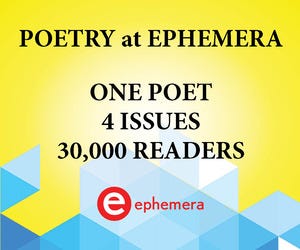Welcome to the Ephemera Newsletter free edition, Dostar! (Kazakh for “friends”)
We’re celebrating Jacquelyn Shah, Ephemera’s poet for the month of April! You can review her poems altogether once they publish as well as her artist statement and bio on this dedicated post on our substack page. We thank you for checking out Jacquelyn’s work.
Standard content matters: Won’t you please check out last week’s issue if you missed it.
And here are some reminders:
Call For Submissions: Submissions are in for the May issues. We look forward to reading! We are open for June now. April 30 is the deadline. If you are a paid subscriber to Ephemera, you can submit to poetry @ Ephemera for free as a membership perk! (We email you a secret link at the end of your second consecutive paid month and every month thereafter for as long as you are a paid subscriber). Free subscribers and anyone else can submit, too, with the reading fee and can submit up to 10 poems. Paying the reading fee will grant you 1-month paid access to Ephemera’s full letter. Learn more or:
In Brief…this week’s features:
Thoughts on The Specials and their cover of last week’s song and renown Jazz track “Take Five.”
Looking at the intricate and beautiful glasswork of Ginny Ruffner.
April’s poet, Jacquelyn Shah and her second of four poems, “Did I?”
Our weekly lists:
3 magazines with open calls
3 awards/prizes
3 recent job listings for editors and writers.
**Sponsor our letter! Reach out to info@Litbreaker.com to advertise with us.**
More ephemera: each issue we feature our Interesante Section, where we present an article or site or interesting bit of info—sometimes a study, sometimes a video, sometimes an interactive site, sometimes an experiment.
In this issue, an article on the brains of jazz musicians.
Book Recs, bonus content, and our mini-essays to start!
Important Book: Fady Joudah
Support us on Bookshop - See our past book recs and others. A highly curated list.
Last Week’s Issue.
Merci. Danke. Kiitos. 고마워 Go-ma-wo. Cảm ơn. Xiè xiè.
Ephemera
Dear Readers,
When in a rut, try practicing. Spend time honing your skills by writing side quests for your characters—biographical vignettes, half-anecdotes, memories, interactions. Write additional lines for your poems that don’t fit or don’t need to fit—lines that are free flowing with no anchor. Write descriptions. Practice using colorful language to describe mundane things, simple language to typify something complex. Anything. Choose randomly if you must. Repeat many times. Pick out several books and read the first five pages of each. The last five. Work on technique. Draft adjacent your main project. Write as not you, maybe as would a peer or hero of yours. Maybe pick up a book, read a bit, and write as they write. Do this several times over. There are myriad ways to practice. Invent one for yourself. The only necessary component is to mean it, write a lot, and do this often. Several considerations are at play here, not the least of which is we often need to write out our junk, write well non-aligned before we can invent our own voice, before we are deft enough; this is like anything, any art. Practice until you can render so well that you can forget what you know and freestyle like a Jazz musician.
“What I want my viewer to do is to think. And I don't want to tell them what to think. I want to invite them to think. Invite them to use their minds, which is one of the highest forms of human activity.”
—Ginny Ruffner, from americanart.si.edu
We’re thinking about this week’s Interesante article which delves into the flow state as it pertains to jazz musicians with brain wave function added in as measured by several important and interesting experiments. Turns out, experts enter flow more readily. Flow is a sensory, creative and reactionary space. Maybe it’s pure voice. Maybe it’s pure being-on-the-page-ness. Being writer. Certainly, it’s a space of greater connectivity, synapses skipped and crossed and lassoed and wrangled in weird unique ways. But practice first. Adjacent thinking can yield insight into the crux of a too-highly-fretted-over impasse. The subconscious, primed with adjacent and indirectly related tasks and ideas can yield via gray matter magic answers or workarounds tackling head on might never have realized. Flow adjacently, tangentially, maybe even oppositely. May we be rutted only by design, never by affliction. Practice and flow be thine antidotes.
Alğıs!
(Gratitude)
Poetry by Jacquelyn Shah
Did I? Like a viper born from the blond force of a dazzling splendor I learned to live in a kiss, pretending to be a vegetable tongue, nearly alive. The only language I recognize is my own. To keep the sky free of luxurious shapes, the moon and Jupiter hang near each other while panty-clad gods enjoy shattering a day into tiny pieces. Blood fingers went marble, sparkling on the hand that utters nothing but blue rearrangements of a desiccated sky, for spite. And not wanting my pen scratching at the heart of life, I chew matches of madness and old moldy membranes of useless questions–– blue warbler says chewchewchewchewchewww . . . I defend myself with this look of nonsense, grim grin of knowing. Dressed in seaweed, gold, and fishscales, did I hold you in and repel all else? Cento––lines, in order of appearance, from: Aimé Césaire, Braulio Arenas, Vicente Aleixandre, Jen Karetnick, William Meredith, V. P. Loggins, Alex Lemon, Octavio Paz, Alissa Quart, Marianne van Hirtum, Rachael Allen, W. S. Graham, Antonin Artaud, Miguel Labordeta, José Maria Hinojosa, D. A. Powell, Federico García Lorca, Harry Roskolenko, J. V. Foix, Karen Leona Anderson
Music: The Specials (Take Five)
Keep reading with a 7-day free trial
Subscribe to Ephemera to keep reading this post and get 7 days of free access to the full post archives.



